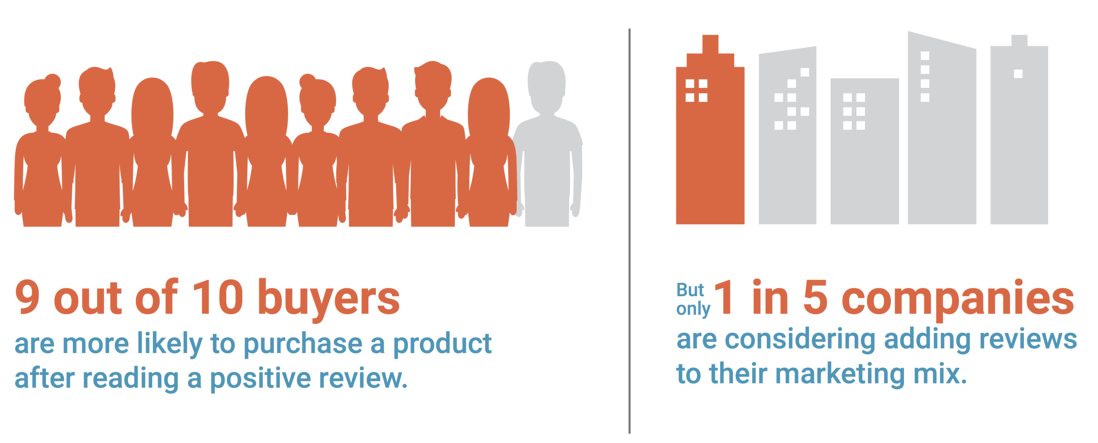
Buyers rely heavily on consumer reviews.
In fact, 92% of B2B buyers are more likely to purchase software, services, and other business solutions after reading a trusted review. This is because up until recently, everything people heard about products came from advertisers.
Advertisers often times shine a bright light on all the good a product does but steer clear of any negative aspects. This norm has caused distrust between buyers and brands, as companies only say good things about themselves.
User reviews do the exact opposite. They shine a light on the good, bad, and ugly. B2B buyers desire this truth and want to set realistic expectations about the product they’re buying. Furthermore, buyers aren’t naive and they know that all products have their flaws. Instead, they are looking for something that solves their problems and best fits their needs.
Since ABM is a partnership between marketing and sales, product reviews give marketers information to pass onto sales so they can better understand what their account wants, needs, or doesn’t care for in a product.
This information is crucial to equip sales teams. It allows them to predict any potential pushback, position the product in a way that fits the account’s needs, and pushes leads further down the sales funnel. Marketers who curate key learnings from reviews and ratings will ensure their salespeople are being proactive instead of reactive.
When reviews are leveraged effectively, marketers gain trust from potential leads, acquire feedback for improvement, and produce content geared toward specific wants and needs expressed in ratings and reviews.
Read more: The Importance of Customer Reviews
3 reasons B2B product reviews are crucial to ABM’s success
Even with all the benefits of using consumer reviews, only 1 in 5 companies consider adding reviews to their marketing plans.
(Source: https://learn.g2.com/consumer-reviews)
When potential buyers are on the hunt for a product to solve one of their pain points, they are more likely to buy after reading a review. It’s hard for sales and marketing to determine purchase intent in any other way. B2B marketing can be tough, but reviews serve as a direct line of communication with people who’ve bought your product or people who are looking to buy.
Not only are reviews read when a consumer is ready to buy, but they’re also read when people are just beginning their search. Reviews help buyers quickly narrow products they’re deciding between.
Buyers leverage reviews at any point in the funnel. No matter where the buyer is in the process, marketers need to consider these three reasons to increase their focus on reviews and ratings in order to see a significant ROI.
Buyer ratings and reviews build trust, give actionable feedback, and produce content.
1) Builds trust
Unfortunately, there is very little trust put on marketers by consumers. They know the end goal of the marketing team is to sell. Why should buyers trust you when they don’t even know you?
That’s where reviews come in. Buyers yearn for authenticity and they get this from reviews and ratings. People who write reviews typically aren’t being bribed for a positive opinion, Instead, they are real users of the product and want to tell you their thoughts on it.
Research shows that products with an average star rating between 4.2-4.7 are more likely to be purchased than those with perfect ratings.
Buyers will see you as a transparent company when you leverage these types of ratings and reviews in campaigns and other promotional materials. And when asking customers for reviews, tell them to be honest. A five-star review will not improve your bottom line.
2) Gives actionable feedback
When working for a company, it’s difficult to imagine not knowing anything about your product. Sometimes you drink the kool-aid and can’t see what’s wrong with your existing product or service.
You don’t often get a whole audience to tell you what they like and dislike about your product. Gather all of the reviews and feedback, then determine some common themes. Take these suggestions to your product development team to make improvements, and tell your sales team what buyers are loving and hating.
The sales team can then leverage that information in meetings and talk about all the customers who love a certain aspect of the product, or highlight an issue their team is working to improve upon.
Negative reviews may expose a real issue with your product, so be sure to thank everyone for any and all feedback given.
How to handle negative reviews
Negative reviews help buyers imagine the worst-case scenario. Misery loves company, and buyers want to see what type of situation they should expect if a specific product disappoints.
85% of consumers look for negative reviews to inform their purchase decision. This adds to the transparency of a company and if your company replies, potential buyers gain even more trust.
Monitor new reviews with an online reputation management software tool and always offer a response to negative feedback and engage with that buyer. Sometimes there’s a misunderstanding or a user-error that can be easily solved. Never blame the buyer, simply apologize and offer assistance. Often times these are the people who turn into brand loyalists.
It’s impossible to please everyone, so negative reviews aren’t going to hurt you unless there are more than positive reviews.
3) Produces content
Ratings and reviews make for great content ideas.
Is there confusion around a certain topic? Explain it in a blog post. Is there someone who loves your product for a very specific reason? Make a case study for your sales team to use.
Through ratings and reviews, you can determine what’s most important to your buyers. Then you can generate content and thought leadership around these topics.
Another opportunity for marketing teams is to use what buyers are saying about the product and pit the benefits against competitors to give your company the competitive edge.
You be the judge
Now it’s your turn to lead your marketing team in leveraging reviews. With consumer ratings and reviews you’ll be able to build trust, improve products, and produce meaningful content. Your salespeople will thank you, plus you’ll have a better ROI.
